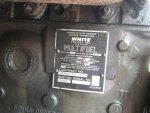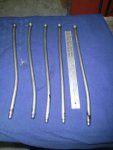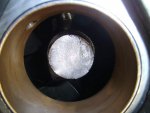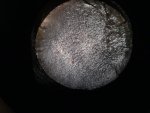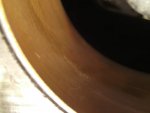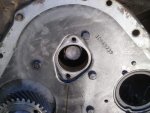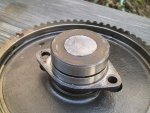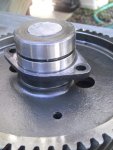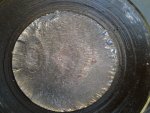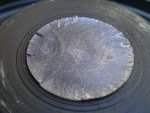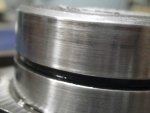oddshot
Active member
- 781
- 121
- 43
- Location
- Jasper, Georgia
LDT 465 Multifuel broken cam. Andy3's M35A2
A couple months ago, Andy3 posted that the multifuel engine in his M35A2 had died on the road. He heard a “thump” and that was it. The truck was towed to 73m819 (Ron)'s shop who found that the engine had broken a cam shaft.
This truck was subsequently towed to the Steel Soldiers Rally where the old engine was lifted out and a used engine installed. These events are covered in the following threads and in the interest of brevity, I would ask that you read them if interested.
http://www.steelsoldiers.com/showthread.php?128165-Deuce-was-dead-on-side-of-the-road
http://www.steelsoldiers.com/showthread.php?130298-SSGR14-Engine-and-Bed-Swap
I remembered reading on this forum that quite a large number of engines has suffered this failure. Although a number of folks have put forth theories about the causes of this failure, I have not seen a thread where somebody disassembled the engine to find the cause, and only one instance where somebody replaced the cam, timing gears, bent valves and bent push-rods and got the truck running. Most folks just find a used engine and trash the old one.
I picked up Andy3's engine at the rally and have begun to disassemble it in the hopes of finding the cause of these broken camshafts. Perhaps there may be a bit of PM we can do to prevent this failure OR maybe we can find out if a repair could be done to these engines ... maybe even in the chassis.
Andy3's engine was built by White in 2-84. Andy3's M35A2 is a 1971 and has about 54,000 miles on it at the time of the failure, obviously this is a replacement engine but there is no way to determine the number of hours on it. There are NO rebuild tags on it, and, so far, I do not see any signs of anyone having been inside this engine. The inside of this engine is VERY clean, it appears to have had frequent oil changes and so far I find no sign of abuse, harsh treatment or evidence of overheating. Andy reports that the engine had been running well at the time of the failure.
Unfortunately, folks who have had this failure did not post any background info on their engines, such as who built it, when it was built or if it had been rebuilt at some time. Most owners did not do any diagnosis beyond establishing that a cam had broken. All of the owners report that their engines had been regularly maintained and running well at the time of the failure.
As I do the tear-down, I will share what I find. Where I can, I will include pictures.
A couple months ago, Andy3 posted that the multifuel engine in his M35A2 had died on the road. He heard a “thump” and that was it. The truck was towed to 73m819 (Ron)'s shop who found that the engine had broken a cam shaft.
This truck was subsequently towed to the Steel Soldiers Rally where the old engine was lifted out and a used engine installed. These events are covered in the following threads and in the interest of brevity, I would ask that you read them if interested.
http://www.steelsoldiers.com/showthread.php?128165-Deuce-was-dead-on-side-of-the-road
http://www.steelsoldiers.com/showthread.php?130298-SSGR14-Engine-and-Bed-Swap
I remembered reading on this forum that quite a large number of engines has suffered this failure. Although a number of folks have put forth theories about the causes of this failure, I have not seen a thread where somebody disassembled the engine to find the cause, and only one instance where somebody replaced the cam, timing gears, bent valves and bent push-rods and got the truck running. Most folks just find a used engine and trash the old one.
I picked up Andy3's engine at the rally and have begun to disassemble it in the hopes of finding the cause of these broken camshafts. Perhaps there may be a bit of PM we can do to prevent this failure OR maybe we can find out if a repair could be done to these engines ... maybe even in the chassis.
Andy3's engine was built by White in 2-84. Andy3's M35A2 is a 1971 and has about 54,000 miles on it at the time of the failure, obviously this is a replacement engine but there is no way to determine the number of hours on it. There are NO rebuild tags on it, and, so far, I do not see any signs of anyone having been inside this engine. The inside of this engine is VERY clean, it appears to have had frequent oil changes and so far I find no sign of abuse, harsh treatment or evidence of overheating. Andy reports that the engine had been running well at the time of the failure.
Unfortunately, folks who have had this failure did not post any background info on their engines, such as who built it, when it was built or if it had been rebuilt at some time. Most owners did not do any diagnosis beyond establishing that a cam had broken. All of the owners report that their engines had been regularly maintained and running well at the time of the failure.
As I do the tear-down, I will share what I find. Where I can, I will include pictures.
Attachments
-
62.8 KB Views: 105
Last edited:


